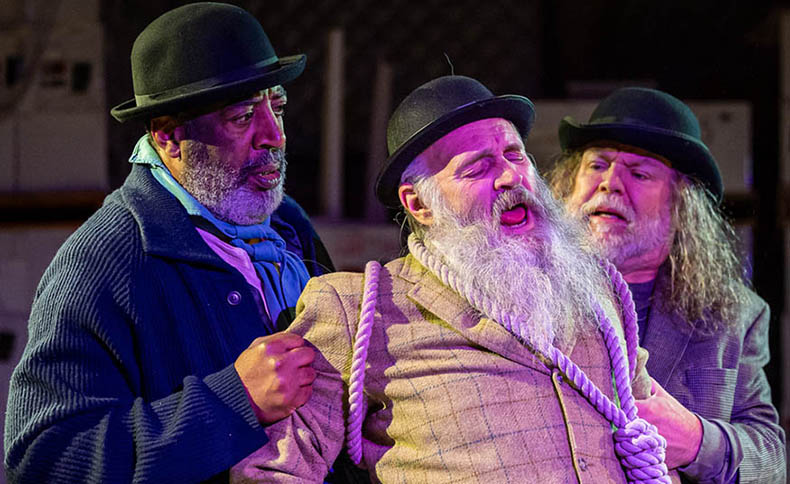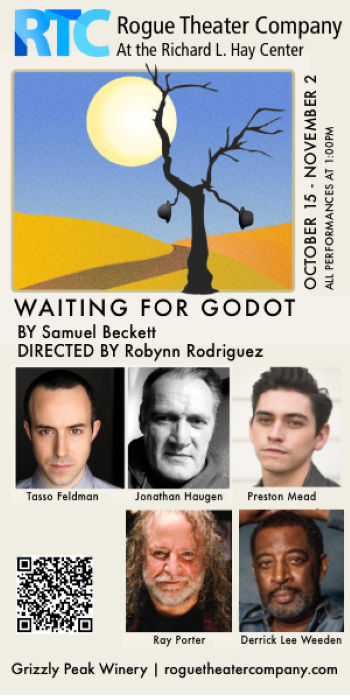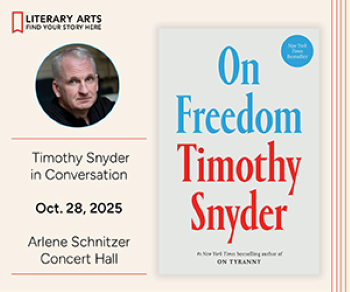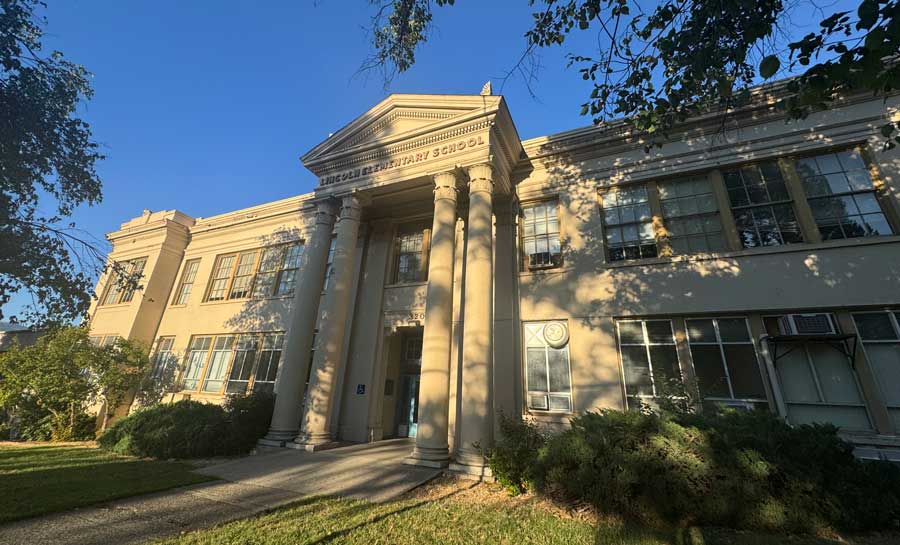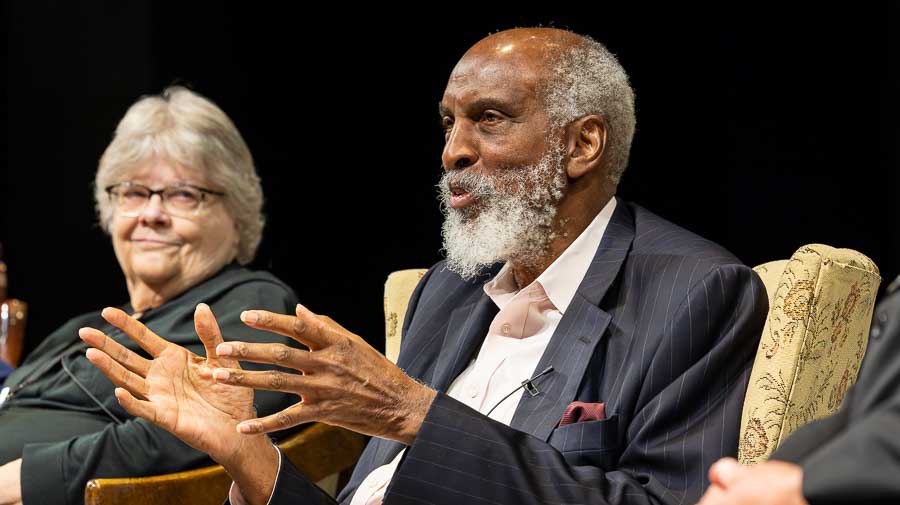Opening of Beckett classic ‘Waiting for Godot’ on Thursday will benefit Planned Parenthood of Southwest Oregon
By Lee Juillerat for Ashland.news
The waiting is almost over.
Beginning Thursday, Oct.16, following a preview performance a day earlier, “Waiting for Godot” will open at the Richard L. Hay Center at the Grizzly Peak Winery. The Rogue Theater Company production of the famous Samuel Beckett play will run through Nov. 2.
“Waiting for Godot” is described by Jessica Sage, the Rogue Theater’s artistic director, as “a masterful exploration of human resilience, hope, and the search for meaning. Beckett’s characters, though caught in endless waiting, embody a kind of quiet strength and humor that reveals the beauty in simply enduring together.
“The play’s simplicity holds profound depth, inviting audiences to reflect on their own lives, relationships, and the courage it takes to keep going. Beckett’s work resonates with anyone who has ever waited for something beyond their control, reminding us that even in the waiting, life unfolds in unexpected and meaningful ways.”
Sage also celebrates “Godot” director Robynn Rodriguez and cast, which includes actors with experience at the Oregon Shakespeare Festival. As she recounts, “When Robynn —who had already dazzled Rogue Theater Company audiences with her direction of ‘Off Peak,’ ‘Chapatti,’ and ‘Circle Mirror Transformation’ — approached me with a proposal to direct Jonathan Haugen, Ray Porter, and Derrick Lee Weeden in ‘Waiting for Godot,’ I thought, ‘What an astonishing powerhouse of artists to unite on one stage!'”
Some changes that Rodriguez and Sage thought about taking didn’t happen. As Sage explains, “Robynn and I considered casting two women in the remaining roles. But then came a curveball: A directive from the Samuel Beckett estate declaring there could be no changes to the characters’ genders. What at first felt like disappointment quickly turned into exhilaration when the cast suggested Tasso Feldman. Tasso — an actor of extraordinary talent — leapt at the chance to play Lucky, and the chemistry is undeniable.

“The final piece of casting,” Sage added, “was The Boy, a role we deliberately left open until just a month before rehearsals in case we went with a college student. I recommended Preston Mead, whom Derrick had previously worked with at OSF, and from the moment he stepped into the role, the circle was complete.”

Sage said she’s pleased to be offering “Godot” for several reasons. As she explains, “What excites me about ‘Waiting for Godot’ is how it embodies everything I love about theater. On the surface, it’s such a simple play — two men waiting for someone who never arrives. And yet, within that simplicity, Beckett gives us a world full of humor, tenderness, futility, and hope.
“For me,” she continued, “it’s the kind of play that ignites conversation. Nothing ‘happens,’ and yet everything happens. We’re asked to reflect on our own waiting, our need for connection, our search for meaning. That’s the kind of theater I believe in — work that provokes thought, sparks dialogue, and lingers long after we leave the theater.”
Sage also notes that “Godot” is also a play that relies entirely on its actors. “With no frills, no distractions, the language and silences become the music, and the performers the instruments. The cherry on top is Michael Ganio’s brilliantly minimalist set.”
In describing the play, she believes that “In a world that can feel uncertain and overwhelming, ‘Godot’ reminds us of our resilience, our absurdity, and our deep need for one another. That’s why it belongs on RTC’s stage.”
The cast includes Tasso Feldman as Pozzo, Jonathan Haugen as Lucky, Preston Robert Mead as The Boy, Ray Porter as Estragnon, and Derrick Lee Weeden as Vladimir. All have extensive experience in theater, including the Oregon Shakespeare Festival, where Weeden appeared over 22 seasons, Haugen for 17, Porter for 15, and Mead for five.
They also have extensive theater experience around the nation. Feldman’s regional credits, for example, include the Denver Center, McCarter Theater, Utah Shakespeare Festival. South Coast Rep. Geffen Playhouse, Lyric Stage Co in Boston. Haugen has performed with the Berkeley Rep, San Jose Rep, Tacoma Actors Guild, Seattle Rep, Arena Stage, Water Street Theatre, ACT, and Theater on Stage.
Mead has appeared in several plays at the Cabaret Theatre. Porter is also a multiple-award-winning audiobook narrator, has voiced characters in video games, and has appeared on several television shows. Weeden’s credits include the Santa Cruz Shakespeare, Syracuse Stage/Seattle Rep, Alabama Shakespeare Festival, Berkeley Repertory, Birmingham Rep in the United Kingdom, Berkeley Repertory Theatre, and Milwaukee Repertory Theatre.

Robynn Rodriguez, Godot’s director, is an actor who began directing plays professionally in 2013. She has directed “Off Peak,” “Chapatti” and “Circle Mirror Transformation” for RTC. A former resident actor at the Oregon Shakespeare Festival, she appeared in plays at the Public Theatre, Guthrie Theater, Shakespeare Theatre Company, Kennedy Center, Berkeley Rep, and the Barbican in the United Kingdom, among others. She has directed “King John,” The Two Gentlemen of Verona” and “As You Like It” at the Utah Shakespeare Festival; “A Lovely Sunday For Creve Coeur” at the American Players Theatre; “Richard III” at the Pacific Conservatory Theatre; “Hedda Gabler” at West Virginia University; and “Twelfth Night” at the University of Texas.
Samuel Barclay Beckett, who wrote “Godot,” was born in Foxrock, County Dublin, on April 13, 1906. He wrote his first novel, “Dream of Fair to Middling Women,” in 1932. In Paris and out of money, he went back to Dublin and then moved temporarily to London, where he worked on much of his next novel, “Murphy.” His first French novel, “Mercier et Camier,” was written between 1947 and 1950. In this time, he also wrote his famous novel trilogy “Molloy” “Malone Dies,” and “The Unnamable.” In 1947, he wrote his first play, “Eleutheria, which he would not allow to be published during his lifetime.
Between 1948 and 1949, Beckett wrote “Waiting for Godot,” which premiered in 1953. Throughout his life he maintained strict artistic control. As with the Rogue request, Beckett regularly denied requests to use female actors in “Godot.” Theater companies that refused to comply were sued.

In the 1950s and 1960s, Beckett’s playwriting included “Endgame,” “Krapp’s Last Tape,” and “Happy Days.” He involved himself in various productions of his plays across Europe and in the United States, wrote his first radio plays, and created innovative prose fiction, including “How It Is” in 1961 and “The Lost Ones” in 1970. A highlight of his career was receiving the Nobel Prize in Literature in 1969. The 1970s were a less prolific period, though he managed some new projects, including television plays for the BBC, and continued to interest himself in productions of his theatrical works. In 1977 he began the autobiographical “Company” and in the early 1980s crafted more prose pieces. His last major work, the prose fiction, “Stirrings Still,” was written in 1986.
The deets
Performances for “Waiting for Godot” will all be at the indoor Richard L. Hay Center at the Grizzly Peak Winery, with performances at 1 p.m. on Wednesdays through Sundays, from Oct. 15 to Nov. 2. The show runs two and a half hours with one intermission. There is no late seating. Advance tickets are $40 or $45 at the door. Discount tickets of $30 are available for the Oct. 15 preview.
The Oct. 16 opening, which will be followed by wine or sparkling water and a talkback with the director and actors, is a benefit for Planned Parenthood of Southwest Oregon.
Special events and discounts include: Wine Wednesdays on Oct. 22 and 29, “Talkback Thursdays” on Oct. 23 and 30, and “Friend Fridays” on Oct. 17, 24, and 31.
For more information, go to roguetheatercompany.org. Tickets are non-refundable and may not be transferred to a different production. Tickets may be exchanged for another performance of “Godot” subject to availability, for a $5 fee per order. Tickets may also be donated back to the theater or transferred to another person for a $5 fee per order.
Email freelance writer Lee Juillerat at [email protected].

